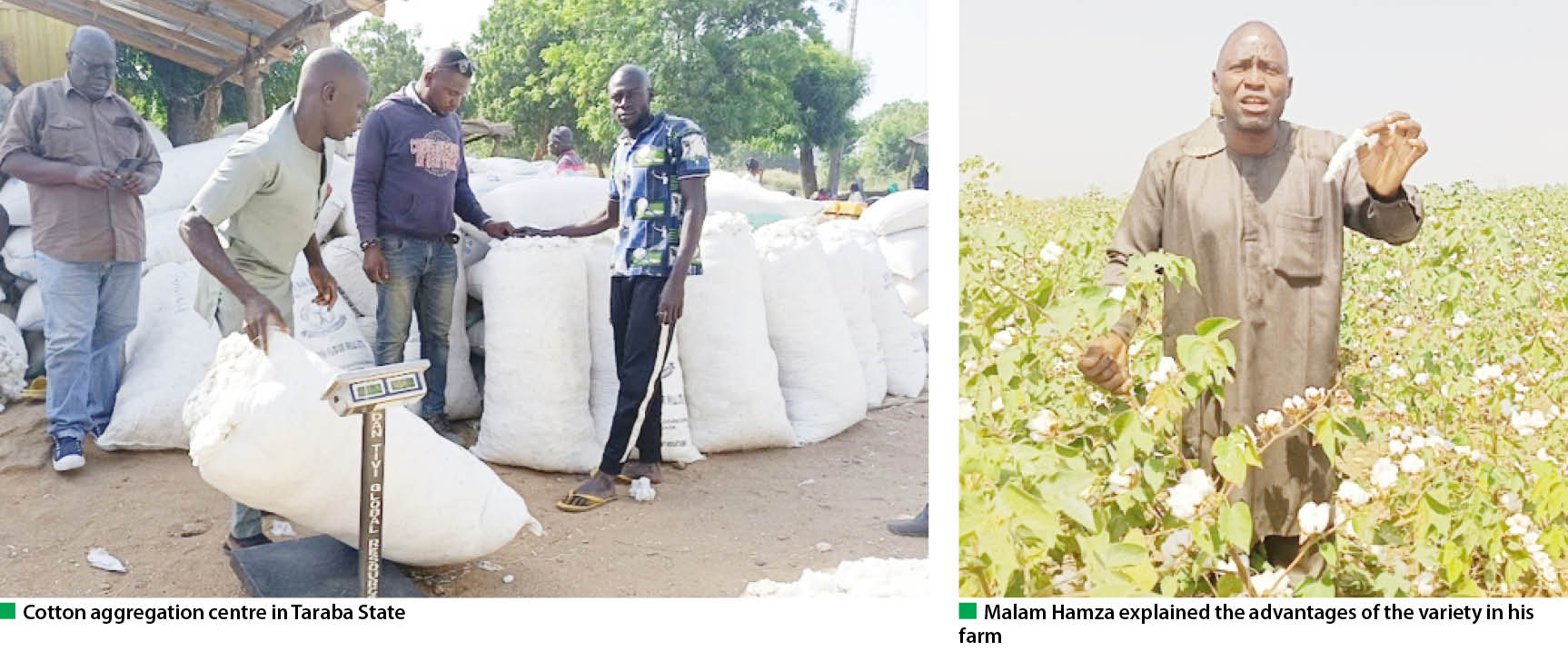Last year, Nigeria saw its worst flood in half a century which destroyed crops, lives and other property across the country.
Many cotton growers in Adamawa State were devastated by the flood which overwhelmed their fields which led to massive yield losses – more than 50 per cent in some farms – and every farmer has a story to tell.
When her fellow farmers saw success with the unconventional biotech variety named Bollgard II, which sold for up to N550,000 per metric tonne, Mama Hauwa Mohammed (46) returned to cotton farming last year.
However, last year’s flood devastated her land, and for her, “It doesn’t matter what I get, that’s how God intended it.”
The mother of four further said, “Whatever happened last season, I hope to increase the farm to at least one hectare this coming planting season.”
Alhaji Umar Musa, said that in his more than 20 years of cotton cultivation he had never seen anything like this, as several farms were damaged by the 2022 flood, notably those close to the Savannah Sugar Company – which is less than five kilometres from the Kem community in Shelleng LGA.
The flood impacted many cotton and soybean farms, resulting in a significant decrease in outputs compared to the previous season when farmers had good cropping.
Also, the price of the crop has not improved over the previous season due to the tension surrounding the country’s general elections next month as market participants are trading with caution, noted Alhaji Umar.
Umar presently buys cotton for N360,000 per metric tonne, but this time last year it was N450,000, and prices are expected to remain stagnant unless the elections are completed next month.
On his part, Muhammed Hamza, who started producing cotton again three years ago after years of abandonment, used the Bollgard II and harvested three metric tonnes on one of his farms and sold each tonne for N450,000.
He said, “Since then I’ve made the decision to grow cotton on this property every year. I planted this in early July, 2022, and by the beginning of December, I harvested. A single plant bears more than 100 bolls, as you can see, which is highly intriguing to every cotton grower. Farmers will undoubtedly prosper if one hectare can yield three tonnes since it can fetch N1.5m.”
Mallam Hamza, who is also a teacher, stated that if the flood had not devastated many crops, some farmers might have gotten more than three tonnes per hectare.
Mr Amos Phiri, who provides the cotton farmers with extension services, said that as more farmers got involved in it, cotton production was rising and that their agronomic practices were also advancing.
He said, “We began with 200 farmers in the first season, then in the following season we received a record of 500 to 700 farmers, and in the following season, which is 2021, we received more than 1,500 farmers. We sold up to 15,000 cartons of seed weighing 15kg each in this region for this season alone, which indicates a significant rise in farmers.”
The increase, according to the extension officer, was caused by the fact that farmers last season enjoyed favourable cotton prices because cotton was sold to merchants for N530, 000 per tonne, which encouraged many farmers to enter the market.
He said, “Previously, the farmers shied away from cotton because of the problems surrounding its growing in this zone as they spent more on spraying and the yield was not particularly impressive.
“When we introduced this cotton type, their production grew significantly because they can produce up to 2.5 tonnes or more per hectare, which has inspired them to pursue farming to the fullest extent possible. With the standard type, they get less than a tonne per hectare, but for now, they are getting more than two tonnes per hectare, and that has encouraged them to start farming, which is why I believe their number keeps rising year in and year out.”
He explained that, “The advantage of Bt cotton, most especially for the farmers, is that it protects its bolls from bollworm, which is the major pest that causes great damage to cotton. Since the bolls have been conserved, they have more bolls counting in some stands, up to 100, but with the conventional one, farmers used to grow “you’ll find out in the stand you will hardly find up to 40 bolls.”
Speaking on the variety’s robustness, Dr Phiri acknowledged that it yields more bolls – more than twice as many as farmers receive from the conventional one – and said that “this is a big advantage of this variety.”
Another benefit is that fewer sprayings are needed because the variety can defend itself against bollworms. If the farm is well cleared and cared for, the farmer won’t have to struggle to control bollworms and will instead focus on other minor pests that impact cotton. Instead of spraying 10 times throughout the season, the farmer will now just need to do so once or twice.
The African Seed Trade Association (AFSTA), based in Nairobi, Kenya, has been tracking the development of the technology in the hands of the farmers and their experiences cultivating it since the start of the Bt cotton variety planting in 2019.
The association’s spokesman, Aghan Daniel, was impressed with the nation’s advancement in the adoption of the Bt technology during a recent visit to the field in Adamawa State and noted that other African nations might learn from Nigeria.

 Join Daily Trust WhatsApp Community For Quick Access To News and Happenings Around You.
Join Daily Trust WhatsApp Community For Quick Access To News and Happenings Around You.


